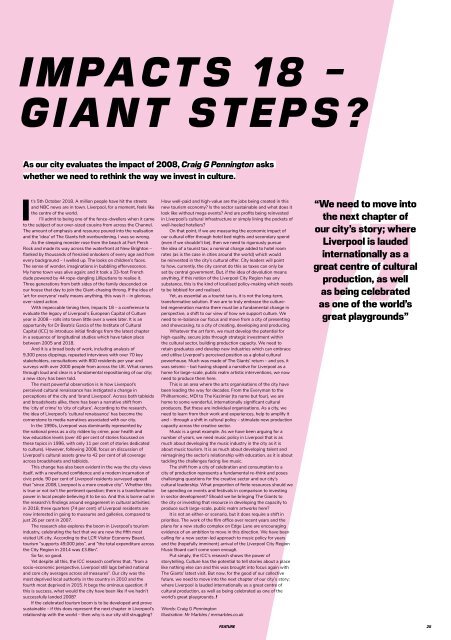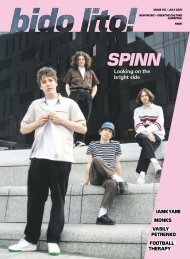Issue 95 / Dec18/Jan19
Dec 2018/Jan 2019 double issue of Bido Lito! magazine. Featuring: CHELCEE GRIMES, REMY JUDE ENSEMBLE, AN ODE TO L8, BRAD STANK, KIARA MOHAMED, MOLLY BURCH, THE CORAL, PORTICO QUARTET, JACK WHITE and much more.
Dec 2018/Jan 2019 double issue of Bido Lito! magazine. Featuring: CHELCEE GRIMES, REMY JUDE ENSEMBLE, AN ODE TO L8, BRAD STANK, KIARA MOHAMED, MOLLY BURCH, THE CORAL, PORTICO QUARTET, JACK WHITE and much more.
Create successful ePaper yourself
Turn your PDF publications into a flip-book with our unique Google optimized e-Paper software.
IMPACTS 18 -<br />
GIANT STEPS?<br />
As our city evaluates the impact of 2008, Craig G Pennington asks<br />
whether we need to rethink the way we invest in culture.<br />
It’s 5th October 2018. A million people have hit the streets<br />
and NBC news are in town. Liverpool, for a moment, feels like<br />
the centre of the world.<br />
I’ll admit to being one of the fence-dwellers when it came<br />
to the subject of our over-sized cousins from across the Channel.<br />
The amount of emphasis and resource poured into the realisation<br />
and the ‘idea’ of The Giants felt overburdening. I was so wrong.<br />
As the sleeping monster rose from the beach at Fort Perch<br />
Rock and made its way across the waterfront at New Brighton –<br />
flanked by thousands of frenzied onlookers of every age and from<br />
every background – I welled up. The looks on children’s faces.<br />
The sense of wonder, imaginations in bubbling effervescence.<br />
My home town was alive again; and it took a 33-foot French<br />
dude powered by 44 rope-dangling Lilliputians to realise it.<br />
Three generations from both sides of the family descended on<br />
our house that day to join the Giant-chasing throng. If the idea of<br />
‘art for everyone’ really means anything, this was it – in glorious,<br />
over-sized action.<br />
With impeccable timing then, Impacts 18 – a conference to<br />
evaluate the legacy of Liverpool’s European Capital of Culture<br />
year in 2008 – rolls into town little over a week later. It is an<br />
opportunity for Dr Beatriz Garcia of the Institute of Cultural<br />
Capital (ICC) to introduce initial findings from the latest chapter<br />
in a sequence of longitudinal studies which have taken place<br />
between 2005 and 2018.<br />
And it is a broad body of work, including analysis of<br />
9,300 press clippings, repeated interviews with over 70 key<br />
stakeholders, consultations with 800 residents per year and<br />
surveys with over 2000 people from across the UK. What comes<br />
through loud and clear is a fundamental repositioning of our city;<br />
a new story has been told.<br />
The most powerful observation is in how Liverpool’s<br />
perceived cultural renaissance has instigated a change in<br />
perceptions of the city and ‘brand Liverpool’. Across both tabloids<br />
and broadsheets alike, there has been a narrative shift from<br />
the ‘city of crime’ to ‘city of culture’. According to the research,<br />
the idea of Liverpool’s ‘cultural renaissance’ has become the<br />
cornerstone to media narratives associated with our city.<br />
In the 1990s, Liverpool was dominantly represented by<br />
the national press as a city ridden by crime, poor health and<br />
low education levels (over 40 per cent of stories focussed on<br />
these topics in 1996, with only 11 per cent of stories dedicated<br />
to culture). However, following 2008, focus on discussion of<br />
Liverpool’s cultural assets grew to 42 per cent of all coverage<br />
across broadsheets and tabloids.<br />
This change has also been evident in the way the city views<br />
itself, with a newfound confidence and a modern incarnation of<br />
civic pride. 90 per cent of Liverpool residents surveyed agreed<br />
that “since 2008, Liverpool is a more creative city”. Whether this<br />
is true or not isn’t the pertinent question; there is a transformative<br />
power in local people believing it to be so. And this is borne out in<br />
the research’s findings around engagement in cultural activities;<br />
in 2018, three quarters (74 per cent) of Liverpool residents are<br />
now interested in going to museums and galleries, compared to<br />
just 26 per cent in 2007.<br />
The research also explores the boom in Liverpool’s tourism<br />
industry, celebrating the fact that we are now the fifth most<br />
visited UK city. According to the LCR Visitor Economy Board,<br />
tourism “supports 49,000 jobs”, and “the total expenditure across<br />
the City Region in 2014 was £3.8bn”.<br />
So far, so good.<br />
Yet despite all this, the ICC research confirms that, “from a<br />
socio-economic perspective, Liverpool still lags behind national<br />
and core city averages across all measures”. Our city was the<br />
most deprived local authority in the country in 2010 and the<br />
fourth most deprived in 2015. It begs the ominous question; if<br />
this is success, what would the city have been like if we hadn’t<br />
successfully landed 2008?<br />
If the celebrated tourism boom is to be developed and prove<br />
sustainable – if this does represent the next chapter in Liverpool’s<br />
relationship with the world – then why is our city still struggling?<br />
How well-paid and high-value are the jobs being created in this<br />
new tourism economy? Is the sector sustainable and what does it<br />
look like without mega events? And are profits being reinvested<br />
in Liverpool’s cultural infrastructure or simply lining the pockets of<br />
well-heeled hoteliers?<br />
On that point, if we are measuring the economic impact of<br />
our cultural offer through hotel bed nights and secondary spend<br />
(even if we shouldn’t be), then we need to rigorously pursue<br />
the idea of a tourist tax; a nominal charge added to hotel room<br />
rates (as is the case in cities around the world) which would<br />
be reinvested in the city’s cultural offer. City leaders will point<br />
to how, currently, the city cannot do this as taxes can only be<br />
set by central government. But, if the idea of devolution means<br />
anything, if this notion of the Liverpool City Region has any<br />
substance, this is the kind of localised policy-making which needs<br />
to be lobbied for and realised.<br />
Yet, as essential as a tourist tax is, it is not the long-term,<br />
transformative solution. If we are to truly embrace the cultureled<br />
regeneration mantra there must be a fundamental change in<br />
perspective, a shift to our view of how we support culture. We<br />
need to re-balance our focus and move from a city of presenting<br />
and showcasing, to a city of creating, developing and producing.<br />
Whatever the art form, we must develop the potential for<br />
high-quality, secure jobs through strategic investment within<br />
the cultural sector, building production capacity. We need to<br />
retain graduates and develop new industries which can embrace<br />
and utilise Liverpool’s perceived position as a global cultural<br />
powerhouse. Much was made of The Giants’ return – and yes, it<br />
was seismic – but having shaped a narrative for Liverpool as a<br />
home for large-scale, public realm artistic interventions, we now<br />
need to produce them here.<br />
This is an area where the arts organisations of the city have<br />
been leading the way for decades. From the Everyman to the<br />
Philharmonic, MDI to The Kazimier (to name but four), we are<br />
home to some wonderful, internationally significant cultural<br />
producers. But these are individual organisations. As a city, we<br />
need to learn from their work and experiences, help to amplify it<br />
and – through a shift in cultural policy – stimulate new production<br />
capacity across the creative sector.<br />
Music is a great example. As we have been arguing for a<br />
number of years, we need music policy in Liverpool that is as<br />
much about developing the music industry in the city as it is<br />
about music tourism. It is as much about developing talent and<br />
reimagining the sector’s relationship with education, as it is about<br />
tackling the challenges facing live music.<br />
The shift from a city of celebration and consumption to a<br />
city of production represents a fundamental re-think and poses<br />
challenging questions for the creative sector and our city’s<br />
cultural leadership. What proportion of finite resources should we<br />
be spending on events and festivals in comparison to investing<br />
in sector development? Should we be bringing The Giants to<br />
the city or investing that resource in developing the capacity to<br />
produce such large-scale, public realm artworks here?<br />
It is not an either-or scenario, but it does require a shift in<br />
priorities. The work of the film office over recent years and the<br />
plans for a new studio complex on Edge Lane are encouraging<br />
evidence of an ambition to move in this direction. We have been<br />
calling for a new sector-led approach to music policy for years<br />
and the (hopefully imminent) arrival of the Liverpool City Region<br />
Music Board can’t come soon enough.<br />
Put simply, the ICC’s research shows the power of<br />
storytelling. Culture has the potential to tell stories about a place<br />
like nothing else can and this was brought into focus again with<br />
The Giants’ latest visit. But now, for the good of our collective<br />
future, we need to move into the next chapter of our city’s story;<br />
where Liverpool is lauded internationally as a great centre of<br />
cultural production, as well as being celebrated as one of the<br />
world’s great playgrounds. !<br />
Words: Craig G Pennington<br />
Illustration: Mr Marbles / mrmarbles.co.uk<br />
“We need to move into<br />
the next chapter of<br />
our city’s story; where<br />
Liverpool is lauded<br />
internationally as a<br />
great centre of cultural<br />
production, as well<br />
as being celebrated<br />
as one of the world’s<br />
great playgrounds”<br />
FEATURE<br />
25


















